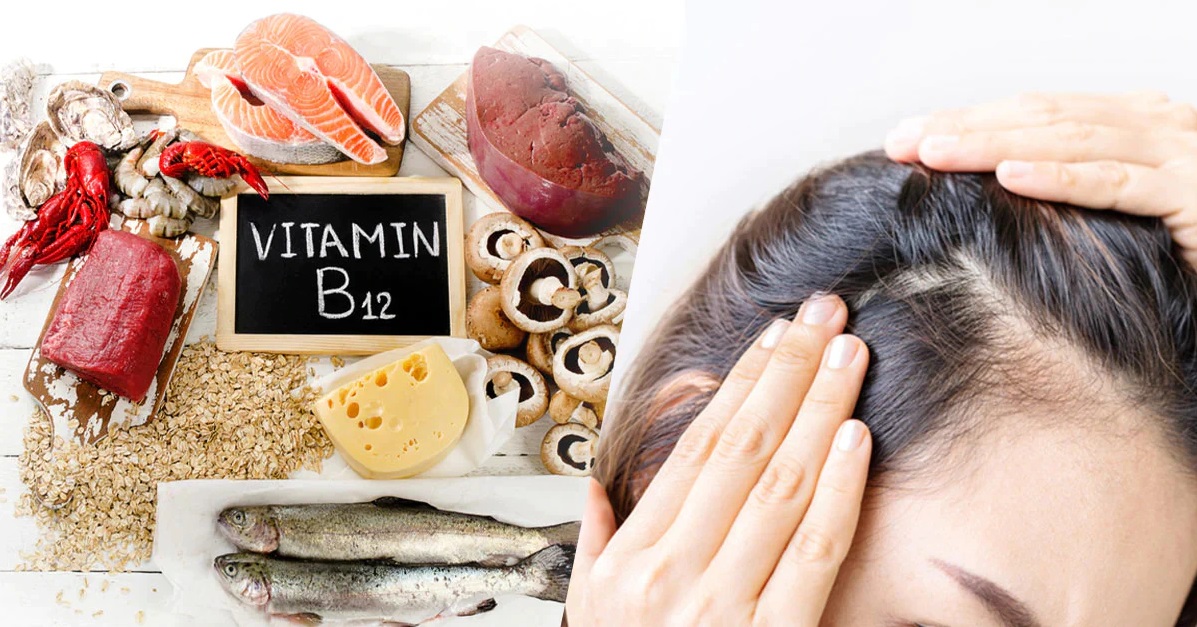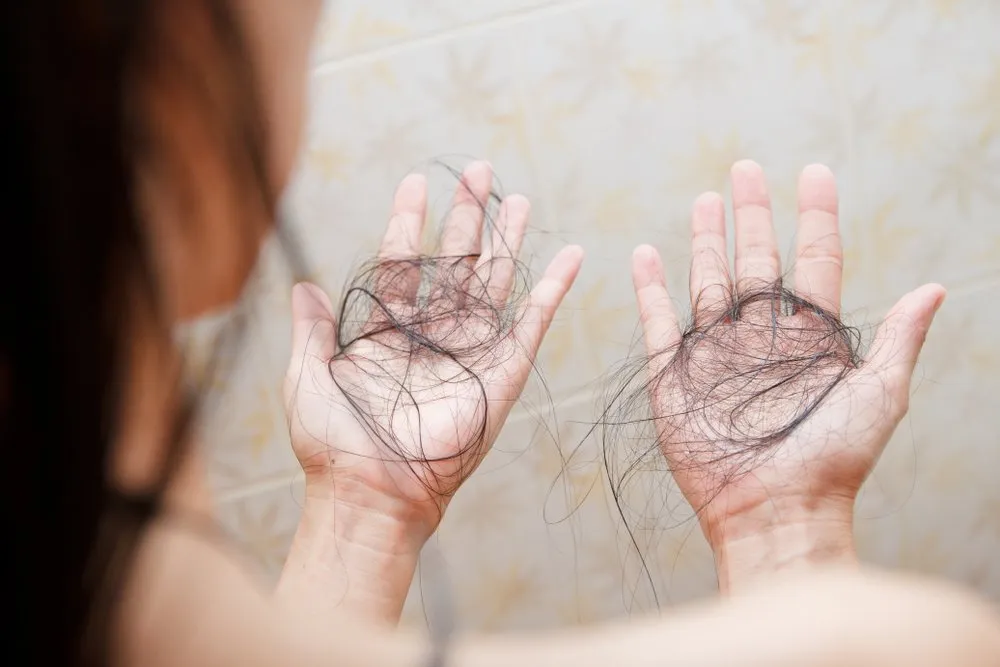Vitamin B12 Deficiency: A Cause of Hair Loss?
Unraveling the intricate connection between essential nutrients and our body’s most visible attributes, this article delves into whether a vitamin B12 deficiency could be a hidden cause of hair loss. We will explore the various facets of hair loss, its common culprits, and specifically examine the role of vitamin B12 in maintaining healthy hair growth.

Understanding Hair Loss
What is Hair Loss?
Hair loss, medically termed alopecia, refers to the excessive shedding of hair from the scalp or other parts of the body. While a certain amount of daily hair shedding is normal as part of the hair growth cycle, true hair loss occurs when the rate of shedding significantly exceeds the rate of new hair growth. This can manifest in various ways, from thinning hair to complete baldness, and often raises concerns about hair health and overall well-being. Understanding the underlying mechanisms is crucial for addressing this common issue.
Types of Hair Loss
Hair loss can present in numerous forms, each with its own characteristic pattern and underlying causes. Androgenetic alopecia, often referred to as male or female pattern hair loss, is one of the most prevalent types, characterized by a receding hairline or thinning at the crown. Other forms include telogen effluvium, a temporary condition of excessive hair shedding often triggered by stress or illness, and alopecia areata, an autoimmune disorder that causes patchy hair loss. Identifying the specific type is a key step in determining potential causes, including any vitamin deficiency.
Common Causes of Hair Loss
While a vitamin B12 deficiency might be a less commonly recognized cause of hair loss, numerous factors contribute to this condition. Genetic predispositions, hormonal imbalances such as those seen in thyroid disorders, and certain medical conditions or medications are frequent culprits. Nutritional deficiencies, including iron deficiency and low vitamin D levels, are also known to negatively impact hair growth. Stress, poor hair care practices, and underlying inflammatory conditions can all contribute to hair shedding and a reduction in healthy hair growth. Understanding these diverse causes is essential for effective intervention.
Vitamin B12 and Its Role
What is Vitamin B12?
Vitamin B12, also known as cobalamin, is an essential water-soluble vitamin that plays a crucial role in numerous bodily functions. This particular vitamin is vital for nerve function, the formation of red blood cells, and DNA synthesis. Its importance extends to energy production and maintaining a healthy metabolism, all of which indirectly contribute to overall hair health. A deficiency in this key vitamin can have widespread impacts on the body.
How Vitamin B12 Supports Hair Health
The intricate connection between vitamin B12 and hair health stems from its fundamental role in cell division and the production of red blood cells, which are responsible for carrying oxygen and nutrients to the hair follicles. Adequate oxygen and nutrient supply are critical for vigorous hair growth and maintaining the integrity of the hair shaft. Without sufficient vitamin B12, hair follicles may not receive the necessary components for healthy hair growth, potentially leading to hair shedding or even hair loss.
Vitamin B12 Deficiency Symptoms
A vitamin B12 deficiency can manifest through a variety of symptoms, many of which can indirectly contribute to hair loss. Common signs include fatigue, weakness, nerve problems such as numbness or tingling, and difficulty with balance. Additionally, individuals experiencing a deficiency may exhibit a pale or jaundiced complexion due to anemia, which directly affects the oxygen supply to hair follicles. While hair loss is not always the primary symptom, it can certainly be an accompanying sign, particularly if the deficiency is prolonged and severe, impacting overall hair health and potentially leading to significant hair shedding.

Deficiency and Hair Loss
Link Between Vitamin B12 Deficiency and Hair Loss
The direct link between vitamin B12 deficiency and hair loss is a topic of ongoing research, but evidence suggests that insufficient B12 levels can indeed contribute to hair shedding and a decline in overall hair health. As vitamin B12 plays a crucial role in cell division and the production of red blood cells, a deficiency impairs the ability of hair follicles to receive adequate oxygen and nutrients. This compromised supply can disrupt the natural hair growth cycle, leading to weaker hair and increased hair loss.
Other Vitamin and Mineral Deficiencies That Cause Hair Loss
Beyond vitamin B12 deficiency, several other vitamin and mineral deficiencies are well-established causes of hair loss. For instance, iron deficiency, a widespread nutritional issue, is a significant contributor to hair loss, particularly in women. Low vitamin D levels have also been linked to hair shedding and conditions like telogen effluvium, where hair prematurely enters a resting and shedding phase. Additionally, deficiencies in biotin, a B vitamin, and even vitamin C, which aids in iron absorption and collagen formation, can compromise hair health and contribute to hair loss.
Iron Deficiency and Its Impact on Hair
Iron deficiency is one of the most common nutritional deficiencies worldwide and a well-recognized cause of hair loss. Iron is vital for the production of hemoglobin, the protein in red blood cells that carries oxygen to cells throughout the body, including the hair follicles. When iron levels are low, hair follicles are deprived of the oxygen and nutrients they need for healthy hair growth, leading to a weakening of the hair shaft and increased hair shedding.
Supplementing for Hair Health
Vitamin B12 Supplements
For individuals experiencing hair loss potentially linked to a vitamin B12 deficiency, supplementation is a direct and effective approach to restore healthy hair growth. A vitamin B12 supplement can help replenish low vitamin B12 levels, thereby supporting the vital processes necessary for robust hair follicles and new hair formation. It's crucial to consult with a healthcare professional before starting any supplementation, as they can accurately diagnose a deficiency and recommend the appropriate dosage and form of vitamin B12, such as cyanocobalamin or methylcobalamin, to effectively address the deficiency and its potential role in hair loss.
Other Vitamins and Minerals for Hair Growth
While addressing a potential vitamin B12 deficiency is important, optimizing the intake of other essential vitamins and minerals is equally crucial for comprehensive hair health and combating hair loss. Beyond vitamin B12, nutrients like iron, vitamin D, biotin, and vitamin C play significant roles. For example, iron deficiency is a well-known cause of hair loss, requiring iron supplementation to support oxygen delivery to hair follicles. Low vitamin D levels have also been associated with hair shedding, making vitamin D supplements beneficial.
Dietary Sources of Vitamin B12
For those looking to maintain optimal vitamin B12 levels or address a mild deficiency without immediate supplementation, incorporating rich dietary sources of vitamin B12 is an excellent strategy for supporting hair health and preventing hair loss. Vitamin B12 is primarily found in animal products, making it particularly important for vegetarians and vegans to pay close attention to their intake. Excellent sources include meat, poultry, fish (especially salmon and tuna), eggs, and dairy products like milk and cheese. Fortified cereals and nutritional yeasts can also provide significant amounts of this essential water-soluble vitamin for those following plant-based diets.
Conclusion
Recap of Vitamin B12's Importance
In summary, vitamin B12 plays an indispensable role in maintaining overall health, with its importance extending directly to the vitality of our hair. This essential water-soluble vitamin is critical for cell division, the formation of red blood cells, and the efficient transport of oxygen and nutrients to the hair follicles. When a vitamin B12 deficiency arises, these vital processes can be compromised, leading to weakened hair and contributing to hair loss.
Final Thoughts on Hair Loss and Deficiency
The intricate relationship between nutritional deficiencies and hair loss is undeniable, with vitamin B12 deficiency emerging as a potential, though often overlooked, cause of hair shedding. If you are experiencing hair loss, it is crucial to consult with a healthcare provider to identify any underlying vitamin and mineral deficiencies. Addressing these deficiencies, particularly vitamin B12, through dietary adjustments or targeted supplementation, can be a pivotal step in restoring hair health and promoting new hair growth, ultimately helping to prevent further hair loss.




